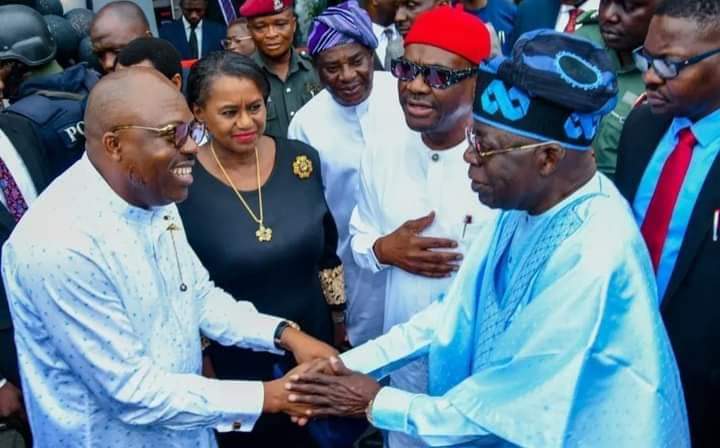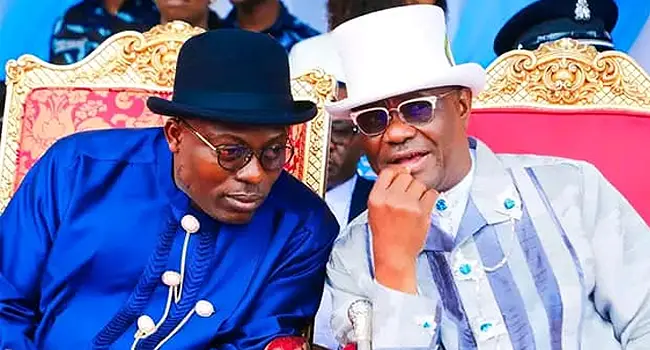Africa
Tinubu and Wike’s Undemocratic Plot Against Fubara: A Dangerous Assault on Rivers State and Nigerian Democracy -By Jeff Okoroafor
If this plot succeeds, it will embolden further power grabs across Nigeria, turning elected offices into puppets of a few political overlords. The time to resist is now. The people of Rivers State, and indeed all Nigerians, must stand against this dangerous erosion of democracy before it is too late.

The political crisis in Rivers State has escalated into a full-blown constitutional crisis, exposing the ruthless machinations of Nigeria’s ruling elite. At the heart of this turmoil is President Bola Tinubu’s apparent collusion with Nyesom Wike, the former governor and current Minister of the Federal Capital Territory (FCT), to undermine and ultimately remove Governor Siminalayi Fubara from office. This brazen power play is not just about Rivers politics—it is a direct attack on Nigeria’s democracy, federalism, and the rule of law.
The Origins of the Crisis: Wike’s Godfatherism vs. Fubara’s Independence

Governor Siminalayi Fubara was elected in 2023 under the platform of the Peoples Democratic Party (PDP), with the backing of his predecessor, Nyesom Wike. However, shortly after taking office, Fubara sought to assert his independence, a move that Wike perceived as a betrayal. What followed was a relentless campaign of sabotage, including:
- Legislative Coup: Wike loyalists in the Rivers State House of Assembly, led by Speaker Martin Amaewhule, initiated an impeachment plot against Fubara in October 2023. This move was widely seen as politically motivated, lacking any substantive constitutional grounds.
- Defections Under Duress: In a controversial move, 27 lawmakers defected from the PDP to the All Progressives Congress (APC), despite a constitutional provision (Section 109(1g)) mandating their seats be declared vacant. Yet, the courts and the National Assembly failed to act decisively, allowing the illegality to stand.
- Violent Intimidation: The state House of Assembly complex was mysteriously set ablaze, and there have been reports of political thuggery aimed at intimidating Fubara’s supporters.
Tinubu’s Questionable “Peace Deal”: A Presidential Seal of Impunity

Rather than allowing democratic institutions to resolve the crisis, President Tinubu intervened in December 2023, imposing a so-called “8-point peace agreement” that heavily favored Wike. The terms of this deal included:
- Reinstating Pro-Wike Commissioners – Fubara was forced to reabsorb commissioners who had resigned in protest, effectively handing control of the state executive back to Wike.
- Recognizing Defected Lawmakers – Despite their clear violation of the constitution, Tinubu’s deal legitimized the defected lawmakers, undermining judicial authority.
- Financial Concessions to Wike’s Camp – Reports suggest that Fubara was pressured to allow Wike’s allies continued access to state funds, ensuring their loyalty.
This agreement was not a mediation but a political ambush, designed to weaken Fubara while consolidating Wike’s grip on Rivers politics. Tinubu’s role in this scheme raises serious questions:
- Why did a sitting president interfere in a state-level political dispute?
- Why did he side with Wike, a man whose politics of intimidation contradicts democratic values?
- Is this part of a larger agenda to weaken opposition states ahead of 2027?
Tinubu’s Hypocrisy: From Democratic Champion to Political Godfather

Sim Fubara and Tinubu
President Tinubu, who once positioned himself as a pro-democracy activist during the military era, is now enabling the same autocratic tendencies he once fought against. His actions in Rivers State mirror his infamous “Lagos godfatherism” model, where governors who defy him are systematically crippled (ask Akinwunmi Ambode).
By backing Wike’s destabilization of Fubara, Tinubu is sending a clear message: opposition governors must submit to APC’s influence or face political annihilation. This is not democracy; it is gangster governance.
The Wider Implications for Nigerian Democracy
The crisis in Rivers has far-reaching consequences:
- Erosion of Federalism: If the federal government can manipulate state politics to remove an elected governor, Nigeria’s federal structure is in grave danger.
- Judicial Compromise: The delayed and inconsistent court rulings on the defected lawmakers suggest political interference in the judiciary.
- Precedent for Future Impeachments: If Fubara can be forced out without due process, no governor in Nigeria is safe from federal overreach.
- Voter Disenfranchisement: The people of Rivers voted for Fubara, not Wike’s proxies. Subverting their will undermines electoral legitimacy.
The Way Forward: Resistance and Accountability

To salvage Nigeria’s democracy, the following steps are crucial:
The Judiciary Must Act: Courts must enforce Section 109(1g) of the Constitution and declare the seats of defected lawmakers vacant.
✔ Civil Society and Media Vigilance: Nigerians must demand accountability from Tinubu and resist any illegal impeachment of Fubara.
✔ Legislative Intervention: The National Assembly must check the president’s overreach and protect constitutional governance.
✔ International Attention: The global community should monitor Nigeria’s democratic backsliding, as seen in Rivers.
The battle in Rivers State is not just about Fubara and Wike—it is about whether Nigeria will remain a democracy or descend into full-blown authoritarian godfatherism. Tinubu’s collusion with Wike to undermine an elected governor is a direct assault on the principles of federalism and popular sovereignty.
If this plot succeeds, it will embolden further power grabs across Nigeria, turning elected offices into puppets of a few political overlords. The time to resist is now. The people of Rivers State, and indeed all Nigerians, must stand against this dangerous erosion of democracy before it is too late.

Jeff Okoroafor
Jeff Okoroafor is a social accountability advocate and a political commentator focused on governance, accountability, and social justice in West Africa.























